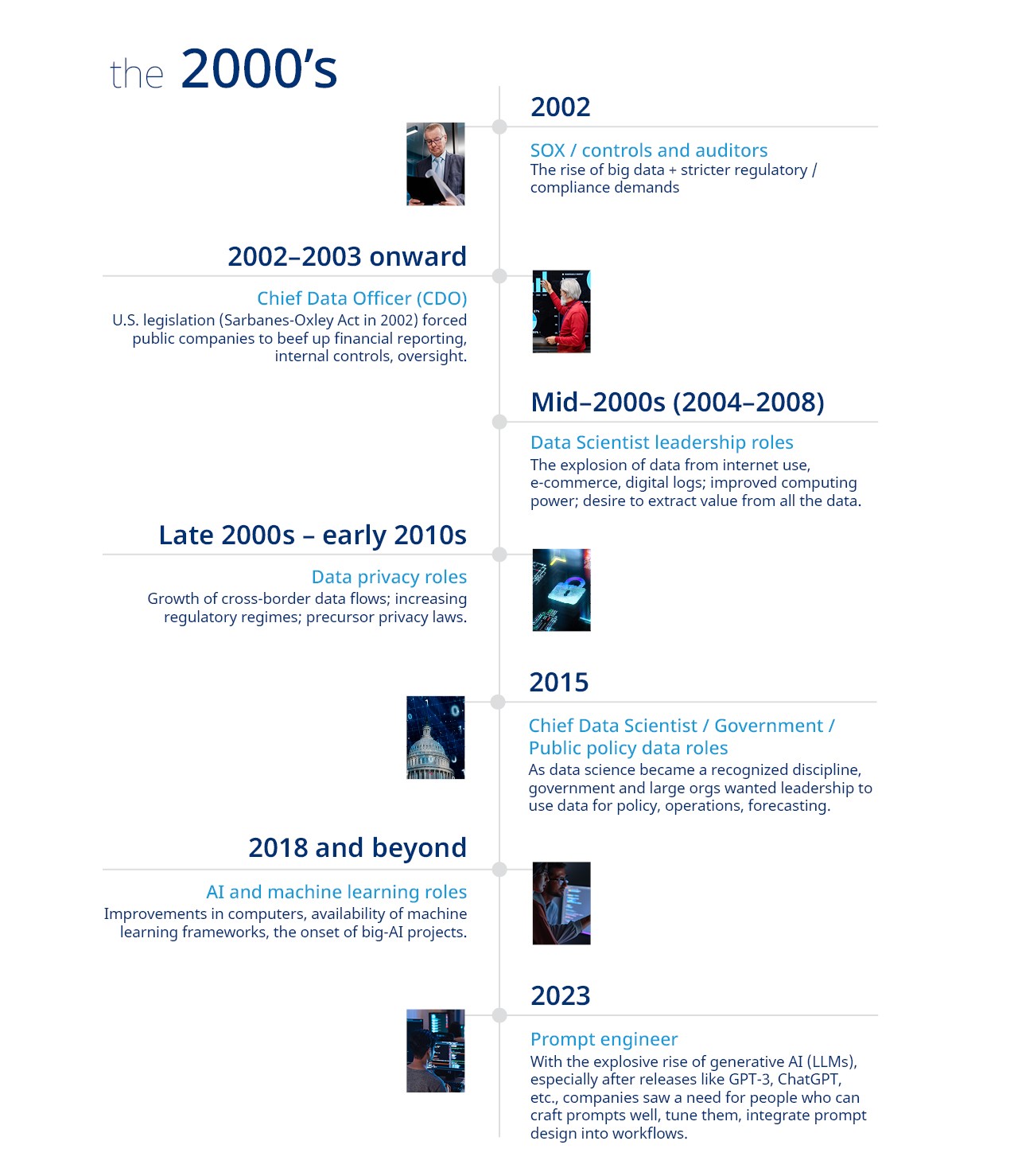As we often say, the world of compensation is always changing.
Every few years something new hits the world of work that impacts how work gets done and what jobs companies need. Depending on how long you’ve been in compensation, you may recall when we had to figure out whether a premium should be paid to finance professionals with skills complying with the new Sarbanes-Oxley Act of 2002. Before that, the information technology boom of the late 1990’s really rocked the compensation world. IT jobs were in such high demand that HR/compensation people pulled them out of the company-wide salary structures and created separate structures just for them…and yes, lessons were learned from that!
What causes new hot jobs to emerge
There are some key factors that lead to the development of new and emerging jobs. Some of the most notable are:
- Advances in technology (e.g., the internet, mobile, cloud, AI
- Regulatory or legislative change (new laws, compliance, industry regulation)
- New business models/platforms (gig economy, remote work, social media)
- Global or social shifts (climate change, sustainability, health crises)
Let’s travel back in time and look at notable emerging jobs/roles over the past couple of decades alongside what triggered them.
Emerging roles timeline

Today we see history repeating itself as we’re in the era of AI and Emerging Tech. Roles related to Machine Learning that didn’t exist even a few years ago are showing up in org charts and on job boards. These roles aren’t experimental; they’re becoming fast must-haves.
Benefits of getting pay right for emerging roles
Emerging roles aren’t optional experiments. They’re core investments. Companies that recognize them early and pay competitively will be the ones shaping — not chasing — the future.
Here’s what you gain when you do pay correctly from the start.
- Competitive advantage in hiring
If you set pay well, you’ll be more likely to attract top talent, including people willing to take on newer or less-defined roles. People with sharper, newer skills (AI, regulation, etc.) are often in short supply. Better pay helps you win in that competition.
- Higher retention and loyalty
When employees feel their pay reflects the value of their role, they tend to stay. They also tend to stay more engaged and are more willing to invest in growing their skills and adapting to change. That reduces turnover costs and disruption.
- Better morale and culture
Fair pay sends a signal that the company respects, values, and is thoughtful about its people. That helps build trust. Pay transparency and fairness around compensation help morale and reduce feelings of resentment.
- Innovation and risk-taking
New roles are often about doing something new — working with new tech, going into new regulatory territory, and creating new value streams. If people feel rewarded well, they’re more likely to take initiative, try bold things, and improve processes. If they feel underpaid or undervalued, they’ll tend to stick with the safe and incremental.
- Internal equity and stability
Getting pay right helps avoid problems with pay compression and internal inequity. That means fewer disturbances when newer hires are paid more, or when people compare what they’re making versus what others are making. It supports fairness, which helps people stay focused.
- Reduced risk and compliance costs
By thinking about fairness, market alignment, and pay transparency early, you reduce the risk of legal or regulatory trouble. Staying ahead of new pay equity or pay transparency laws means you avoid fines, litigation, and negative publicity.
- Cost efficiency in the long run
If you do it right up front, you can preempt the need to correct mistakes retroactively, avoid losing employees and paying more for replacements, and reduce recruiting and training costs, among other benefits. Investing a little more now can mitigate costs later.
Summing up: why it really matters
Because emerging roles are often ambiguous and sometimes risky (for both employees and employers), compensation is a big lever. It’s one of the clearest ways you can show that you believe in the role, value the responsibilities, and want to build trust.
If you get pay wrong, you not only risk losing out on the value these new roles are supposed to bring, but also risk financial unsustainability, harming your culture, creating internal resentments, and weakening your ability to adapt.
If you get pay right, you build a foundation of fairness, motivation, and competitiveness, which ensures those new roles can become real assets — not liabilities.
And, the good news is — you’ve got this, with Mercer’s trusted data at your side.
Mercer is committed to providing the salary survey data that you need to develop competitive pay for your workforce. Let our team help you figure out which surveys and modules will help you assess your compensation and get pay right. Call us at 855-286-5302 or email surveys@mercer.com.
Gearing up to discuss changes in your compensation strategy for emerging roles? Use the prompts in the downloadable worksheet below when buidling out your arguments, slide decks, or discussion topics.
Download The Worksheet